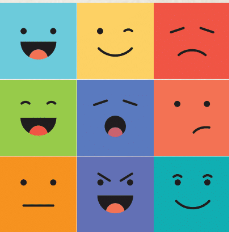HOW EMOTIONS HELP US
What are you feeling right now? Are you curious? Hopeful that you’ll learn something about yourself? Bored because this is something you have to do for school and you’re not really into it — or happy because it’s a school project you enjoy? Perhaps you’re distracted by something else, like feeling excited about your weekend plans or sad because you just went through a bad experience. Anyway, emotions like these are part of human nature as they give us information about what we’re experiencing and help us know how to react. We sense our emotions from the time we’re babies. Infants and young children react to their emotions with facial expressions or with actions like laughing, cuddling, chortling or crying. They feel and show emotions; however, they don’t yet have the ability to name the emotion or say why they feel that way. As we grow up, we become more skilled in understanding emotions; unlike little kids, we can identify what we feel and put it into words. With time and practice, we get better at knowing what we are feeling and why. This skill is called emotional awareness. Emotional awareness helps us know what we need and want (or don’t want!). It helps us build better relationships. That’s because being aware of our emotions can help us talk about feelings more clearly, and move past difficult feelings more easily. Some people are naturally more in touch with their emotions than others. The good news is, everyone can be more aware of their emotions. It just takes practice. But it’s worth the effort: emotional awareness is the first step toward building emotional intelligence, a skill that can help people succeed in life. Emotions come and go. Most of us feel many different emotions throughout the day. Some last just a few seconds. Others last longer.

